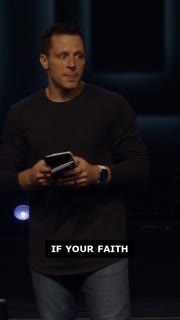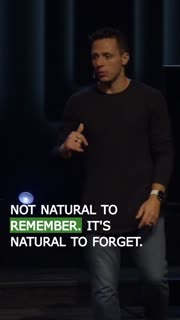Reflexes of Forgiveness: Embracing Grace in Relationships
Devotional
Sermon Summary
Bible Study Guide
Sermon Clips
1. "What's your reflex when you've been wronged? Do you laugh at them? Do you get angry? Like, power up. You cut them off. Like you don't pick up their phone calls anymore. You ghost them, shun them, keep track. Remember what they did. Wait for the right time to bring it up. Like what's your reflex when you've been wronged? Think about that. Here's another question. What's your reflex, not when you've been wronged, but when you've been righted, right? When someone has done good for you. When they've gone above and beyond. They've gone out of their way. They've been thoughtful. They've been caring. They have done good for your sake. What's your reflex? How do you respond?" [03:37] (55 seconds)
2. "Now, right here. Is the picture of what the kingdom of God is like. What it looks like to live as if God is king. This is the first part of it. I don't know about you, but for a long time, this is not how I understood the whole Christianity, church, following Jesus, whatever you want to call it. This is not how I understood it. Right? The king has the opportunity to cancel everything. And he does. For me, I understood Christianity. Like, if I'm going to buy into it. If I'm going to buy into this. If I'm going to do this. It's like he takes out a ledger. And now, you've got to live with a ledger." [10:37] (42 seconds)
3. "The story here is Jesus saying, the king leaves behind the ledger. But for so many of us, we think about church. We think about God. We think about following Jesus. And it's like, all right, well, now I'm signed up for God to watch me at a distance and keep track of the things that I do. You know? And so, it feels like there's God just waiting. Like, oh, I heard you say the F word. You know? Like, that was one too many drinks. Should we really be watching that show? If you're someone who's new to church and that's how you picture God, then it's time to repaint the picture. It's not life with a ledger. The story is that God leaves behind the ledger." [11:18] (43 seconds)
4. "If your faith feels heavy, if it feels like a have to instead of a get to, if you feel like you've got to perform, if you feel like you've got to put on your Christian hat, you might be living as if God has a ledger. And the story is, like, right off the bat, this guy who owes an unbelievable amount of his debt is canceled. It's radical. It's radical. Okay. So, there it is. There's part one, right? Now, this is a pretty amazing story if you think about it. The guy owes $4 billion and instantly it's gone. His portfolio is transformed. It's a weight lifted. So, the question is, well, what's his reflex? What is he going to do?" [12:03] (41 seconds)
5. "It's not natural to remember. It's natural to forget. It's not natural for a teacher to remember what it's like to be a student. It's not natural for a parent to remember what it's like to be a kid. It's not natural for someone who's in church to remember what it feels like to not be in church. To remember that feeling of being an outsider. That awkward feeling of walking to a new place for the first time. Those are things that need to be done intentionally because we tend to forget. It's not natural to remember. It's natural to forget." [17:12] (31 seconds)
6. "If you're struggling to let go because someone's wronged you, it might be because you're right. They had no right to do what they did, to say what they said, to ask for what they asked for, to cross that line. To go to that place. They had no right. They're wrong and you're right. And you might be. You might be. Until you zoom out and you step back and find out, whoa, this guy was just forgiven this. A debt of an unbelievable amount was just canceled. Now he's unwilling to cancel that. And everyone's outraged. It's universal outrage when you know the whole story." [18:44] (45 seconds)
7. "The biggest enemy of spiritual growth for us, the thing that gets in the way of our spiritual development, our faith continuing to grow, it's hurry. It's like, we're in such a rush. And so we jump to conclusions. We see things with a limited perspective. Not too long ago, I was going to see one of my good friends in New Hampshire. And my plan was to take the ferry out of Port Jeff to go to Bridgeport and then drive the rest of the way up. And I was going there to relax. It was his birthday. We were going to go skiing. And I'm like, okay, I'm going to go relax, celebrate my friend's birthday with him, go skiing." [22:25] (35 seconds)
8. "If you're someone who follows Jesus, then there's a King in your story who canceled your debt. And the idea is that God looks. He looks at the ugliest parts of me, like the most twisted, self-gratifying, selfish parts of me. And he doesn't excuse them. He doesn't say, well, all right, if I think about it, you kind of had a reason for acting that way. And so I'm willing to look the other way. No, he looks at the things that are inexcusable and he chooses not to hold them against me. That's a canceled debt. And if we'll sit and like, maybe pull over and think of that, like I've got my issues." [28:03] (55 seconds)
9. "What I'm not saying when I say forgive, what I'm not saying is you put yourself in a situation where you're going to continue to be hurt or you put yourself in danger or you let him move back in or whatever the situation is, right? The king does not give that servant 10,000 more talents to go blow, but he doesn't hold it against him. And within you, there's part of you, you can choose to hold it against him or not. But if you do, if Jesus meant what he said and knew what he was talking about, then you're the one that pays for that. Then I'm the one that pays for that." [30:01] (34 seconds)
10. "Who needs you to pull over? And gain perspective? Because there are none of us, there are none of us that are out of the reach of situations like this. You might be surprised to see the clarity that you find when you pull over." [34:00] (14 seconds)
Ask a question about this sermon
2. "Now, right here. Is the picture of what the kingdom of God is like. What it looks like to live as if God is king. This is the first part of it. I don't know about you, but for a long time, this is not how I understood the whole Christianity, church, following Jesus, whatever you want to call it. This is not how I understood it. Right? The king has the opportunity to cancel everything. And he does. For me, I understood Christianity. Like, if I'm going to buy into it. If I'm going to buy into this. If I'm going to do this. It's like he takes out a ledger. And now, you've got to live with a ledger." [10:37] (42 seconds)
3. "The story here is Jesus saying, the king leaves behind the ledger. But for so many of us, we think about church. We think about God. We think about following Jesus. And it's like, all right, well, now I'm signed up for God to watch me at a distance and keep track of the things that I do. You know? And so, it feels like there's God just waiting. Like, oh, I heard you say the F word. You know? Like, that was one too many drinks. Should we really be watching that show? If you're someone who's new to church and that's how you picture God, then it's time to repaint the picture. It's not life with a ledger. The story is that God leaves behind the ledger." [11:18] (43 seconds)
4. "If your faith feels heavy, if it feels like a have to instead of a get to, if you feel like you've got to perform, if you feel like you've got to put on your Christian hat, you might be living as if God has a ledger. And the story is, like, right off the bat, this guy who owes an unbelievable amount of his debt is canceled. It's radical. It's radical. Okay. So, there it is. There's part one, right? Now, this is a pretty amazing story if you think about it. The guy owes $4 billion and instantly it's gone. His portfolio is transformed. It's a weight lifted. So, the question is, well, what's his reflex? What is he going to do?" [12:03] (41 seconds)
5. "It's not natural to remember. It's natural to forget. It's not natural for a teacher to remember what it's like to be a student. It's not natural for a parent to remember what it's like to be a kid. It's not natural for someone who's in church to remember what it feels like to not be in church. To remember that feeling of being an outsider. That awkward feeling of walking to a new place for the first time. Those are things that need to be done intentionally because we tend to forget. It's not natural to remember. It's natural to forget." [17:12] (31 seconds)
6. "If you're struggling to let go because someone's wronged you, it might be because you're right. They had no right to do what they did, to say what they said, to ask for what they asked for, to cross that line. To go to that place. They had no right. They're wrong and you're right. And you might be. You might be. Until you zoom out and you step back and find out, whoa, this guy was just forgiven this. A debt of an unbelievable amount was just canceled. Now he's unwilling to cancel that. And everyone's outraged. It's universal outrage when you know the whole story." [18:44] (45 seconds)
7. "The biggest enemy of spiritual growth for us, the thing that gets in the way of our spiritual development, our faith continuing to grow, it's hurry. It's like, we're in such a rush. And so we jump to conclusions. We see things with a limited perspective. Not too long ago, I was going to see one of my good friends in New Hampshire. And my plan was to take the ferry out of Port Jeff to go to Bridgeport and then drive the rest of the way up. And I was going there to relax. It was his birthday. We were going to go skiing. And I'm like, okay, I'm going to go relax, celebrate my friend's birthday with him, go skiing." [22:25] (35 seconds)
8. "If you're someone who follows Jesus, then there's a King in your story who canceled your debt. And the idea is that God looks. He looks at the ugliest parts of me, like the most twisted, self-gratifying, selfish parts of me. And he doesn't excuse them. He doesn't say, well, all right, if I think about it, you kind of had a reason for acting that way. And so I'm willing to look the other way. No, he looks at the things that are inexcusable and he chooses not to hold them against me. That's a canceled debt. And if we'll sit and like, maybe pull over and think of that, like I've got my issues." [28:03] (55 seconds)
9. "What I'm not saying when I say forgive, what I'm not saying is you put yourself in a situation where you're going to continue to be hurt or you put yourself in danger or you let him move back in or whatever the situation is, right? The king does not give that servant 10,000 more talents to go blow, but he doesn't hold it against him. And within you, there's part of you, you can choose to hold it against him or not. But if you do, if Jesus meant what he said and knew what he was talking about, then you're the one that pays for that. Then I'm the one that pays for that." [30:01] (34 seconds)
10. "Who needs you to pull over? And gain perspective? Because there are none of us, there are none of us that are out of the reach of situations like this. You might be surprised to see the clarity that you find when you pull over." [34:00] (14 seconds)








